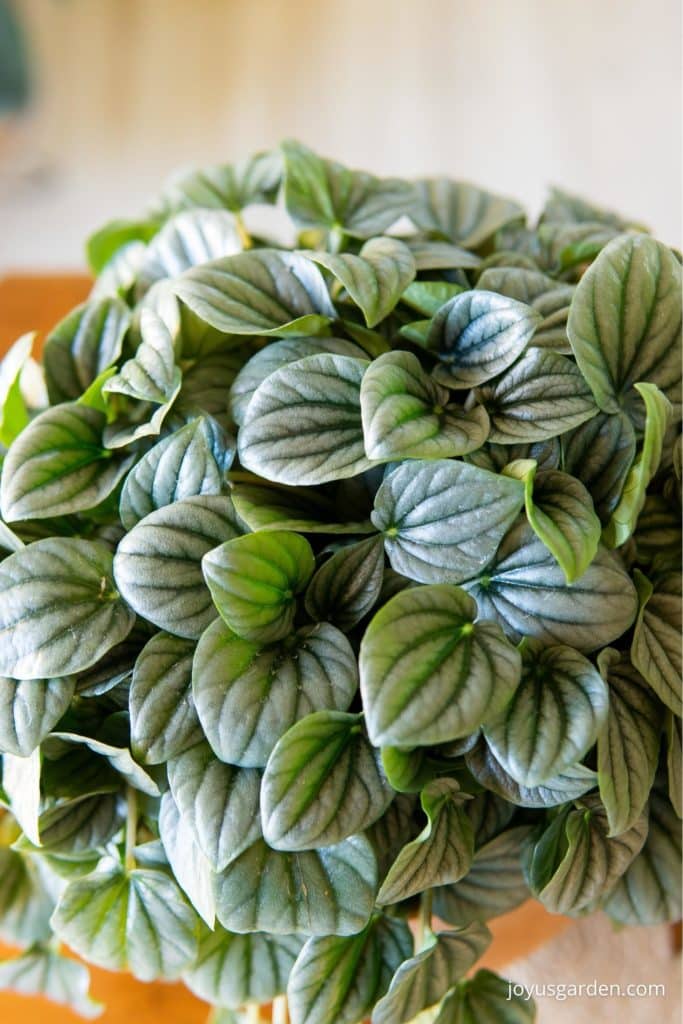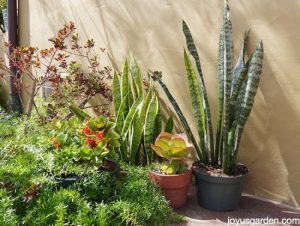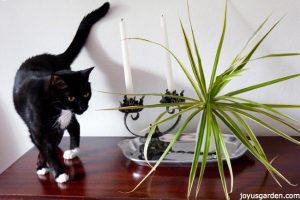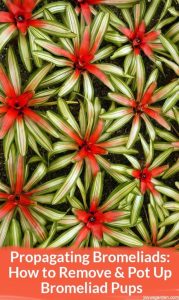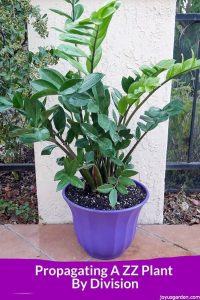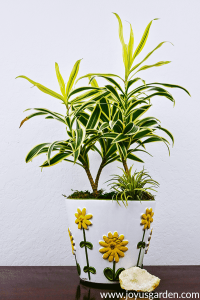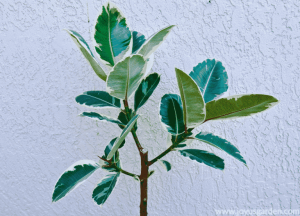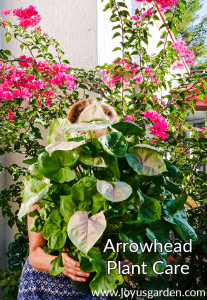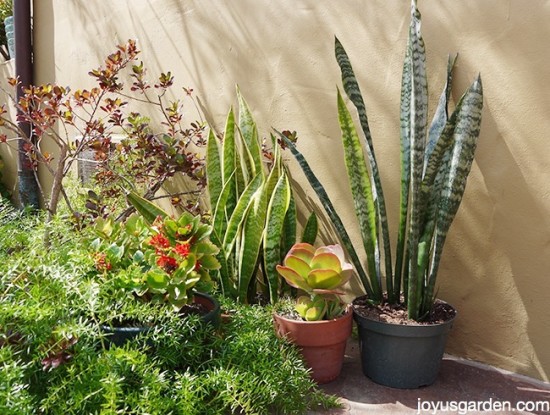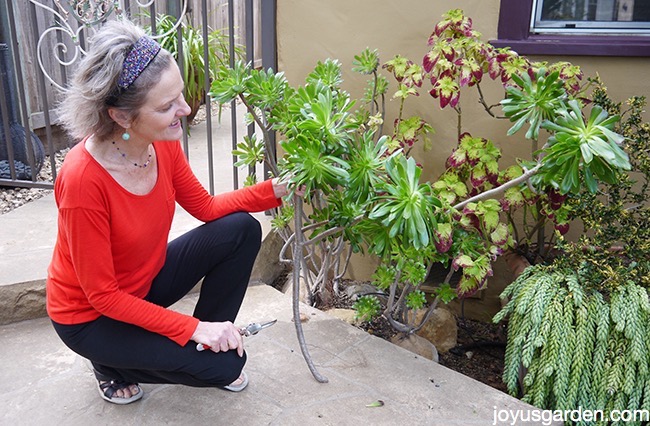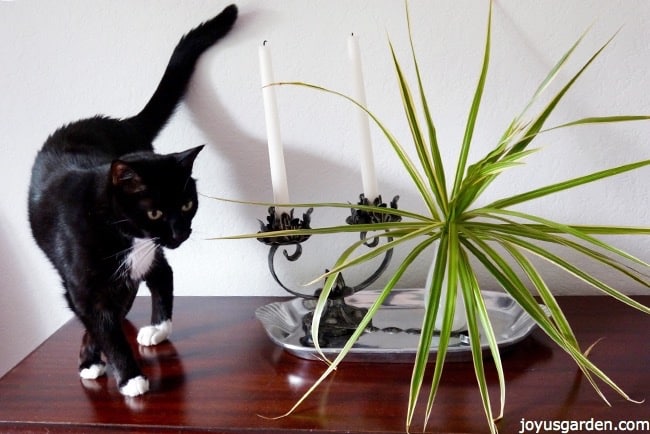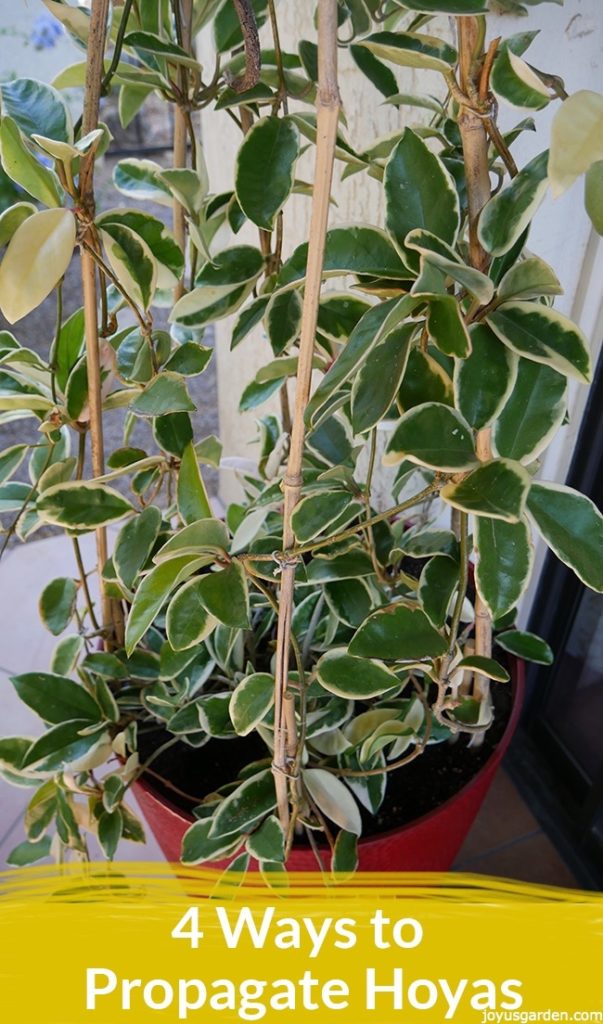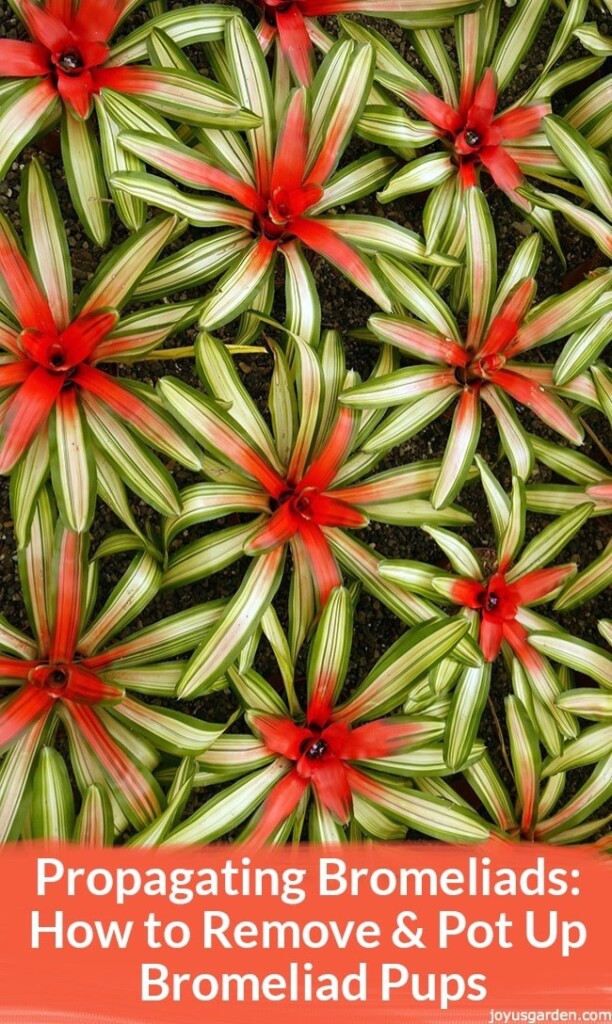If you’re looking for a plant that stays small, has gorgeous foliage, and is easy to maintain, look no further. This is all about Watermelon Peperomia care and how to grow this beautiful plant.
Despite being a tropical plant, peperomias, are easy to care for. I have 7 different species/varieties and all handle the dry desert air (I live in Tucson, AZ) like champs!
- Common Name: Watermelon Peperomia
- Botanical Name: Peperomia Argyreia
- As you can see, the foliage of this plant resembles watermelon rind.
Looks just like watermelon rind to me!
Table of Contents
Watermelon Peperomia Traits
Size
Watermelon Peperomia plants stay compact. They’re commonly sold in 4″ and 6″ grow pots. The average size is 12″ x 12″.
As they grow, the lower leaves spread out and relax a bit giving them a more open form.
Growth Rate
This is in general a slow grower. Here in sunny, warm Tucson, many of my indoor plants grow fast. This is a slow to moderate growing plant for me.
Uses
This is a tabletop plant. It doesn’t take up a lot of room so you can squeeze it in almost everywhere.
Why is this plant popular?
The vibrant foliage!
Related: Peperomia Obtusifolia Care, Peperomia Care, Repotting Peperomia Plants, Propagating & Pruning Baby Rubber Plant, & How to Plant Baby Rubber Plant Cuttings.
Watermelon Peperomia Care Video Guide

Some Of Our General Houseplant Guides For Your Reference: Guide To Watering Indoor Plants, Beginner’s Guide To Repotting Plants, How to Clean Houseplants, Winter Houseplant Care Guide, Plant Humidity: How I Increase Humidity For Houseplants, Buying Houseplants: 14 Tips For Indoor Gardening Newbies
Watermelon Peperomia Care
Light/Exposure
Mine is growing in moderately bright light. It’s 8′ away from a south-facing window and receives no direct light.
This is one plant that can tolerate lower light levels just fine. If the light is too low=no growth. If in hot sun=burn.
You may have to move your Watermelon Peperomia to a brighter spot in the darker winter months so it gets the light it needs. Here are more tips on Winter Houseplant Care.
Watering
I can’t tell you how often to water yours because there are variables that come into play like pot size, soil mix composition, the location where it’s growing, and your home’s environment.
In general, water your Watermelon Peperomia when the soil is 3/4 dry. In the summer months, you’ll water more often, in the winter months, less often.
Because there’s a lot of sun, heat, and lack of humidity here, I water mine every 5-6 days in the warmer months. In winter, it’s every 7-12 days. You may not need to water yours as often depending on what climate you’re in.
The thick leaves and fleshy stems store water. Don’t keep yours too wet or it’ll lead to root rot.
It’s best if the bottom of the pot has 1 or more drainage holes so the excess water can flow out.
Too little water=drooping, too much water=drooping peperomia.
 100vw, 1024px” data-pin-media=”https://www.joyusgarden.com/wp-content/uploads/2022/04/watermelonpeperomia3-2.jpg” data-lazy-src=”https://www.joyusgarden.com/wp-content/uploads/2022/04/watermelonpeperomia3-2-1024×683.jpg” data-pin-description=”Elevate your indoor plant game with our top-notch advice on caring for Watermelon Peperomia, also known as Peperomia Argyreia.” data-pin-title=”Essential Watermelon Peperomia Care Tips: How to Keep Yours Thriving” /></a></figure>
</div>
<p><em>As you can see, this plant grows in a bit of an open & airy form. Those wine-colored stems on the left topped with light green are the Watermelon Peperomia flowers.</em></p>
<h3 class=) Temperature
Temperature
If your house is comfortable for you, it’ll be so for your indoor plants too.
Be sure to keep yours away from cold drafts as well as any blasts from air conditioning or heating vents.
Humidity
Peperomias are native to subtropical and tropical regions so they prefer humid conditions. Despite this, the ones sold in the houseplant trade are mostly adaptable when it comes to humidity.
As I write this in mid-April the humidity is 11%. Dry to say the least and my Watermelon Peperomia is doing fine!
I have this humidity reader in my living room/dining room. It’s cheap and gets the job done. I run my tabletop humidifiers when the humidity is below 30%, which is a good deal of the time here in Arizona.
I also give my peperomia a shower in the kitchen sink every month and put it outside for an hour or so when the summer rains roll in.
If you think yours is stressed in regards to humidity, you can also try filling a saucer with small rocks and water and put your plant on top of it. Just make sure the drain holes aren’t submerged.
You can also mist your peperomia a few times a week. Here’s the little sprayer that I’ve used for over 3 years now and it still works like a charm.
Fertilizer
The best times to feed your indoor plants are spring, summer, and early fall.
Every spring I give my houseplants (except air plants, bromeliads, and orchids) a little application of worm compost/compost. Be careful not to use too much, a 1/4″ layer for a 6″ pot will be fine. It breaks down slowly and works into the soil every time you water.
I give my peperomias a watering with Eleanor’s VF-11 3 or 4 times during the warmer months. Online orders of this product are delayed now because of the 2022 supply chain issue but keep checking back if you can’t find it locally.
Alternately, I feed with Maxsea 3-4 times per year also. We have a long growing season here so my plants need and appreciate the nourishment.
Other options would be this kelp/seaweed fertilizer and Joyful Dirt. Both are popular and get great reviews.
Fertilizing twice a year may be enough for your peperomia. Don’t overfertilize (use too much a ratio or do it too often) because many fertilizers are high in salts which can eventually burn plant roots.
Soil/Repotting
Same as with fertilizing and feeding, spring, summer, and early fall are the optimum times for repotting.
You can check out this post and video on Peperomia repotting for all the details and the step-by-step on how to do it.
Watermelon Peperomias don’t need repotting often (every 5 years if not stressed from being potbound) because they stay compact and don’t grow fast. In regards to a bigger pot, only go up 1 size. For instance, from a 4″ grow pot to a 6″ grow pot.
In a nutshell, I use a potting mix of 1:1 potting soil to DIY succulent and cactus mix. The latter contains coco chips and coco coir (a more sustainable alternative to peat moss) which peperomias love. I also throw in a few handfuls of compost and top with worm compost.
You’ll also find alternative soil mixes suitable for peperomia repotting in the post.
Pruning
Not much is needed pruning-wise with this plant. Once or twice a year I’ll snip off a dying or dead lower leaf and that’s it.
It doesn’t grow outward and trail like its cousin the Baby Rubber Plant. Because it stays compact, no need for pruning.
I do take off the spent flowers, but they easily pull right off.
You can see how dense & tight this peperomia grows as compared to the more openness of the Watermelon Peperomia.
Propagation
I’ve never propagated a Watermelon Peperomia, but I have the Peperomia obtusifolia by stem cuttings and also division.
My friend did propagate a Watermelon peperomia by stem cuttings in water. I’ve read you can also propagate it by leaf cuttings.
Pests
My peperomias have never gotten any pests. I imagine they could be prone to mealybugs because of their fleshy leaves and stems. Also, keep your eyes out for spider mites.
If your plant isn’t healthy, it’ll be more susceptible to pests.
Pests can travel from plant to plant fast and multiply overnight so make sure you get them under control as soon as you spot them.
Pet Safety
Ring the chimes! This one is listed as non-toxic to cats and dogs on the ASPCA website.
Flowers
Yes, they do. The flowers are tiny, green, and appear in clusters on the ends of wine-colored stems. If your Watermelon Peperomia is healthy and happy, it’ll flower.
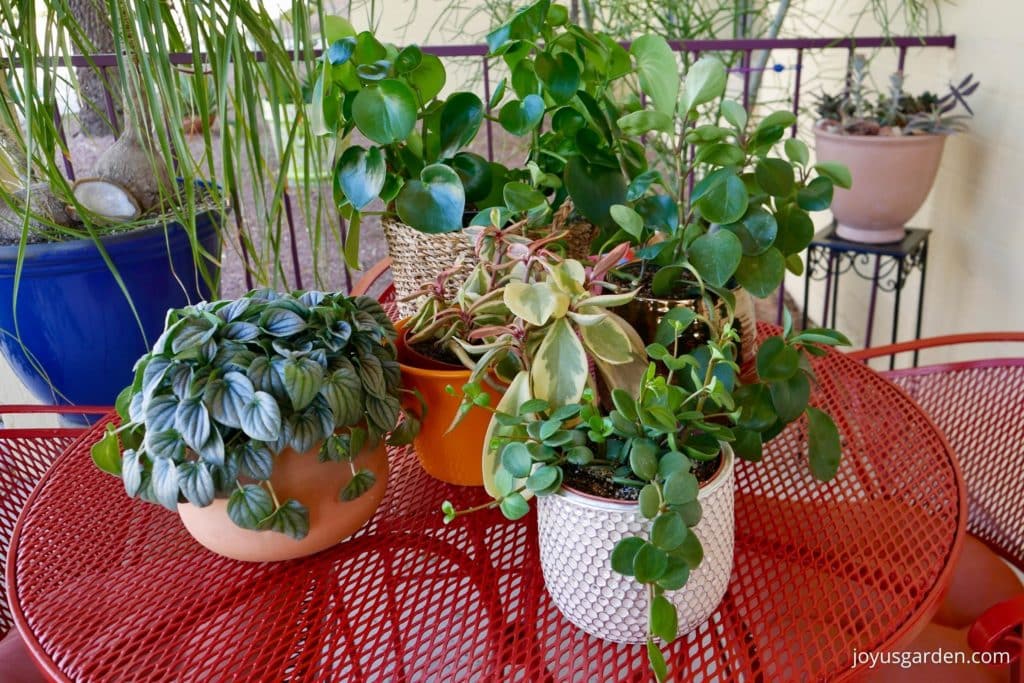
A couple more of my peperomias. That’s Peperomia Hope in the white metallic pot & Peperomia Rainbow
Table of Contents

Nell Foster
Nell, the founder of Joy Us garden, was born into a gardening family and grew up in Connecticut’s countryside. After living in Boston, New York, San Francisco, & Santa Barbara, she now calls the Arizona desert home. She studied horticulture & garden design, working in the field all her life. Nell is a gardener, designer, blogger, Youtube creator, & author. She’s been gardening for a very long time & wants to share what she’s learned with you.

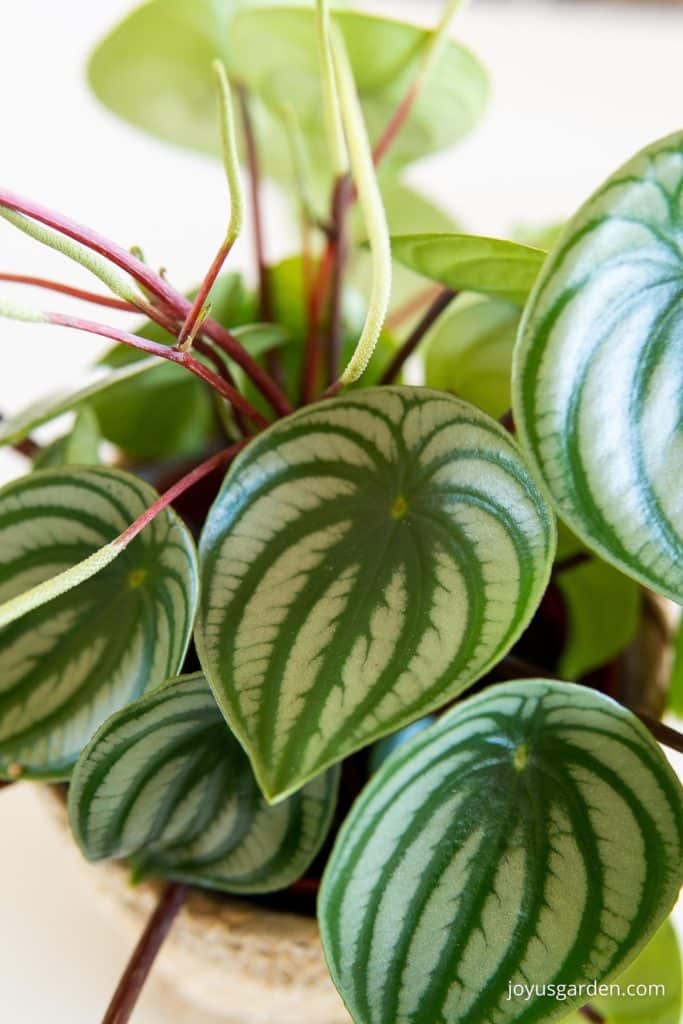
 100vw, 1024px” data-pin-media=”https://www.joyusgarden.com/wp-content/uploads/2022/04/watermelonpeperomia1.jpg” data-lazy-src=”https://www.joyusgarden.com/wp-content/uploads/2022/04/watermelonpeperomia1-1024×683.jpg” data-pin-description=”Elevate your indoor plant game with our top-notch advice on caring for Watermelon Peperomia, also known as Peperomia Argyreia.” data-pin-title=”Essential Watermelon Peperomia Care Tips: How to Keep Yours Thriving” /></a></figure>
</div>
<p><em>My Peperomia caperata, Peperomia Raindrop, & Peperomia obtusifolia. Different, but all have gorgeous foliage.</em></p>
<div id=)
